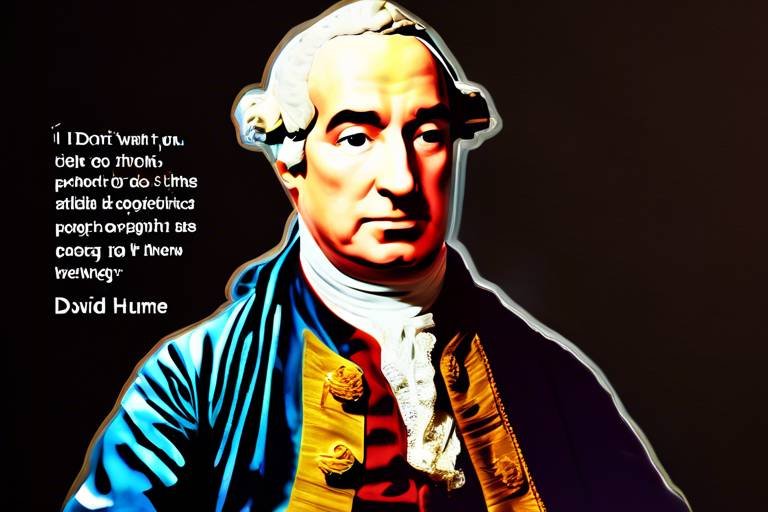Sam Harris's Moral Landscape - A Critique
In an era where moral dilemmas seem to abound, Sam Harris's concept of the moral landscape offers a provocative lens through which to view ethics. Harris posits that moral values can be understood in terms of human well-being, suggesting that there exists a measurable terrain of moral truths that can be scientifically explored. This idea is not only ambitious but also contentious, as it invites us to consider the very foundations of morality itself. Can we truly reduce complex moral questions to a set of scientific principles? What are the implications of such a framework on our everyday ethical decisions? As we delve deeper into Harris's moral landscape, we will explore its strengths, weaknesses, and the broader implications it holds for contemporary philosophy and ethics.
At its core, Harris's moral landscape is a metaphorical map where various moral values correspond to different elevations of human well-being. Imagine a vast landscape where peaks represent optimal states of happiness and valleys signify suffering. According to Harris, just as we can measure physical landscapes, we can also measure moral landscapes through the lens of science. This approach seeks to provide a scientific basis for ethics, challenging traditional views that often rely on subjective interpretations of right and wrong. By anchoring morality in human well-being—a concept that can be empirically assessed—Harris aims to create a universal framework for understanding ethical behavior.
Harris argues that moral truths are not merely social constructs but can be derived from scientific inquiry. He believes that through empirical research, we can uncover objective moral facts that align with human flourishing. This perspective raises intriguing questions about the relationship between empirical evidence and ethical reasoning. For instance, if we can agree on what constitutes well-being, can we then establish a set of moral guidelines that everyone should follow? Harris's assertion challenges us to consider whether morality can be as rigorous and testable as the natural sciences. However, this idealistic view prompts skepticism: can we truly measure the nuances of human experience in a way that translates to universally applicable moral truths?
The tension between objective and subjective morality is at the heart of Harris's critique. While he champions the idea of objective moral truths grounded in well-being, many argue that individual moral beliefs are inherently subjective, shaped by personal experiences, cultural backgrounds, and societal norms. This divergence raises critical questions about the feasibility of a singular moral landscape that applies to all. If morality is subjective, how can we reconcile differing views on what constitutes moral behavior? This discourse is vital as it underscores the complexity of ethical discussions in a pluralistic society.
Critics of Harris's objective morality often cite several philosophical objections. One major concern is the challenge of establishing universally applicable moral truths. Can we truly claim that one set of moral values is superior to another? Furthermore, the risk of oversimplifying moral dilemmas into binary choices—good or bad—can lead to ethical oversights. The intricacies of human emotions and the context of situations often defy such simplifications. As we navigate through ethical landscapes, we must remain cautious of the pitfalls that come with asserting a singular moral truth.
When we consider the role of subjectivity in moral decisions, it becomes evident that personal experiences and cultural contexts significantly influence our ethical judgments. For instance, what one culture deems acceptable may be viewed as abhorrent by another. This plurality of perspectives challenges the notion of a standardized moral landscape. As we explore Harris's framework, we must ask ourselves: is it realistic to expect a one-size-fits-all approach to morality in a world rich with diverse beliefs and practices?
Harris's moral landscape framework has profound implications for real-world ethical decision-making. In fields like policy-making and law, the idea of grounding decisions in human well-being can lead to more compassionate and effective outcomes. For example, policies aimed at reducing poverty or improving healthcare align with the goal of enhancing overall well-being. However, the challenge lies in translating these abstract principles into actionable steps. How do we prioritize well-being in a world where resources are limited, and competing interests abound?
As we critically examine Harris's moral landscape, it's essential to acknowledge the philosophical critiques that arise. Different ethical frameworks, such as consequentialism, deontology, and virtue ethics, offer alternative perspectives that challenge Harris's assertions. Each of these frameworks presents unique insights into the complexities of moral reasoning, emphasizing that the discourse surrounding ethics is far from settled.
Consequentialism, which focuses on the outcomes of actions, presents limitations when viewed through Harris's lens. Critics argue that a purely consequentialist approach may overlook the importance of intentions and moral duties. While Harris emphasizes well-being as the ultimate goal, this perspective raises questions about the ethical implications of actions taken solely for their outcomes. Are we sacrificing the richness of moral reasoning for a simplified view of ethics?
Deontological ethics, which prioritizes duties and rights, further complicates Harris's framework. Critics from this perspective argue that moral considerations cannot be reduced to mere outcomes. The importance of duty, respect for individuals, and adherence to moral rules must be factored into ethical discussions. This critique highlights the necessity of considering multiple dimensions of morality, rather than relying solely on well-being as a guiding principle.
At the heart of Harris's moral framework is the concept of well-being. However, the definition of well-being is not as straightforward as it may seem. Different interpretations—ranging from physical health to emotional fulfillment—can significantly impact ethical considerations. For instance, what constitutes well-being for one person may differ drastically for another. This variability challenges the notion of a standardized moral landscape and raises critical questions about how we define and measure well-being in ethical discussions.
In Harris's framework, well-being can encompass various dimensions, including physical, emotional, and social aspects. Each of these dimensions plays a crucial role in shaping our moral judgments. However, the subjective nature of well-being complicates its application in ethical discourse. How do we reconcile differing definitions of well-being when making moral decisions? This complexity underscores the need for a nuanced understanding of well-being as we navigate the moral landscape.
One of the most significant challenges in establishing a moral landscape based on well-being is the difficulty in quantifying it. Unlike physical measurements, well-being is inherently subjective and influenced by countless factors. The complexities involved in assessing well-being raise questions about the feasibility of creating a moral framework grounded in measurable outcomes. As we strive to understand and apply Harris's moral landscape, we must grapple with these challenges to ensure that our ethical discussions remain relevant and meaningful.
- What is Sam Harris's moral landscape? - It's a framework suggesting that moral values can be measured against human well-being, aiming to provide a scientific basis for ethics.
- How does Harris derive moral truths from science? - He argues that empirical evidence can reveal objective moral facts related to human flourishing.
- What are the main critiques of Harris's framework? - Critics highlight the tension between objective and subjective morality, the oversimplification of moral dilemmas, and the challenges in defining and measuring well-being.

The Concept of the Moral Landscape
In his thought-provoking work, Sam Harris introduces the idea of a moral landscape, a concept that invites us to rethink the very foundations of ethics. Imagine a vast, intricate landscape where the peaks represent the highest states of human well-being and the valleys symbolize the depths of suffering. This metaphorical terrain is not just a poetic notion; it serves as a framework for understanding how moral values can be aligned with the scientific understanding of human experiences. Harris argues that just as we can measure physical phenomena, we can also assess moral values based on their impact on human well-being.
At the heart of Harris's moral landscape lies the assertion that there are objective moral truths that can be discovered through science. This perspective challenges the traditional view that morality is merely a subjective construct shaped by cultural and personal beliefs. Instead, Harris posits that we can evaluate moral actions based on their consequences for human flourishing. This approach seeks to establish a connection between empirical evidence and ethical reasoning, suggesting that moral questions can be answered much like scientific inquiries.
For instance, consider the following key points that illustrate the essence of Harris's moral landscape:
- The idea that moral values can be mapped onto a spectrum of well-being.
- The belief that some actions are universally better than others based on their outcomes.
- The emphasis on using scientific methods to determine what constitutes a good life.
However, this bold assertion raises important questions: Can morality truly be distilled into a set of measurable outcomes? Is it possible to create a universally applicable moral framework that transcends individual beliefs and cultural differences? These questions are central to the ongoing debate surrounding Harris's moral landscape.
As we delve deeper into this concept, we begin to uncover its implications for contemporary ethics and philosophy. The idea that we can quantify moral values against the backdrop of human well-being opens up new avenues for ethical discourse. It challenges us to consider how we define well-being and whether our current moral frameworks are sufficient to address the complexities of human experience. In doing so, Harris invites us to re-examine not only our ethical beliefs but also the very nature of morality itself.
Ultimately, the concept of the moral landscape serves as a catalyst for a broader discussion about the intersection of science and ethics. It encourages us to explore how empirical evidence can inform our understanding of right and wrong, pushing the boundaries of traditional moral philosophy. As we navigate this landscape, we must remain open to the possibilities and challenges that arise, recognizing that the journey toward understanding morality is as intricate as the landscape itself.

Scientific Foundations of Morality
When diving into Sam Harris's concept of morality, one cannot overlook the intriguing premise that moral truths can be derived from scientific inquiry. Harris argues that just as we can measure physical phenomena and understand the laws of nature, we can also apply a similar methodology to ethics. This notion challenges traditional views that often place morality in the realm of subjective beliefs or cultural norms. Instead, Harris posits that there exists a moral landscape where values can be assessed based on their impact on human well-being.
At the core of Harris's argument is the idea that morality is not merely a social construct but can be grounded in objective reality. He suggests that certain actions can be empirically evaluated based on their consequences for human flourishing. This is where the intersection of science and ethics becomes particularly compelling. By utilizing tools from psychology, neuroscience, and even evolutionary biology, Harris aims to establish a framework for understanding morality that is both rigorous and applicable to real-world situations.
But how do we define this so-called well-being? Harris emphasizes the importance of a shared understanding of what constitutes a good life. He argues that well-being encompasses various dimensions, including physical health, emotional stability, and social connectivity. Thus, the scientific foundations of morality hinge on our ability to measure these aspects effectively. Here are some key components:
- Physical Well-Being: This includes health metrics, access to resources, and overall physical condition.
- Emotional Well-Being: Psychological health, happiness, and life satisfaction play crucial roles.
- Social Well-Being: The quality of relationships and community engagement significantly impacts moral considerations.
However, while Harris's approach is revolutionary, it is not without its challenges. One significant critique is the difficulty in quantifying well-being. How do we measure happiness, for instance? Is it a matter of self-reporting, or can we rely on observable behaviors? These questions highlight the complexities inherent in establishing a moral landscape that can be universally applied. Furthermore, the reliance on empirical evidence raises the question of whether all moral dilemmas can be resolved through scientific means.
In essence, Harris's framework invites us to reconsider the intersection of science and morality. It opens up discussions about whether objective moral truths exist and challenges us to think critically about how we define and measure well-being. While it offers a fresh perspective, it also leaves us grappling with profound questions about the nature of ethics and our understanding of what it means to live a good life.

Objective Morality vs. Subjective Morality
When we dive into the deep waters of morality, we often find ourselves grappling with two distinct yet intertwined concepts: objective morality and subjective morality. Sam Harris champions the idea of objective morality, suggesting that moral truths exist independently of human opinions and can be measured against the well-being of conscious creatures. This notion is enticing, as it implies a universal standard—a moral compass that transcends cultural differences and personal biases. But, is it really as straightforward as it sounds?
On the flip side, subjective morality posits that our moral beliefs are shaped by personal experiences, cultural backgrounds, and societal influences. This perspective argues that what is deemed "right" or "wrong" can vary dramatically from one individual or culture to another. Think about it: a practice considered morally acceptable in one culture might be viewed as abhorrent in another. This raises the question: can there ever be a single moral landscape that applies to everyone?
Harris's framework attempts to bridge this divide by asserting that while individual experiences may color our perceptions of morality, there are still underlying truths that can be scientifically examined. For instance, he suggests that actions leading to increased human well-being are objectively better than those that do not. However, critics argue that this view oversimplifies the complex nature of human morality. How do we account for the myriad factors that influence our moral decisions? Can we truly measure well-being in a way that is universally accepted?
To further complicate matters, consider the implications of each perspective:
- Objective Morality: If objective moral truths exist, it could lead to a more unified ethical framework, potentially reducing conflict. However, it raises concerns about cultural imperialism—imposing one set of moral beliefs on diverse populations.
- Subjective Morality: Embracing subjectivity allows for a richer understanding of human experiences and ethical diversity, but it risks moral relativism, where anything goes as long as it feels right to someone.
Ultimately, the tension between objective and subjective morality invites a deeper exploration of how we define right and wrong. Is it possible to create a moral landscape that respects individual differences while also advocating for universal principles? As we navigate these philosophical waters, it becomes clear that the conversation around morality is not just academic; it is deeply personal and profoundly impactful on our lives.
- What is objective morality? Objective morality refers to the idea that certain moral truths exist independently of individual beliefs or cultural norms.
- What is subjective morality? Subjective morality suggests that moral judgments are shaped by personal experiences and cultural contexts, meaning that they can vary from person to person.
- Can both objective and subjective morality coexist? Yes, many philosophers argue that while there may be objective moral truths, individual interpretations and cultural influences play a significant role in how these truths are understood and applied.
- What are the implications of each perspective on ethical decision-making? Objective morality may promote universal ethical standards, while subjective morality encourages a more nuanced understanding of diverse perspectives, potentially leading to richer discussions but also moral disputes.

Critiques of Objective Morality
When we dive into the murky waters of objective morality, we quickly realize that the notion isn't as clear-cut as it might seem. Sam Harris posits that moral truths exist independently of human opinion, suggesting that we can measure these truths against the well-being of conscious creatures. While this sounds appealing, critics argue that such a stance is fraught with complications. One major critique revolves around the idea that moral truths cannot be universally applied to all cultures and societies. After all, what might be considered a moral truth in one culture could be seen as anathema in another. This cultural relativism raises the question: can there truly be a single moral landscape that applies universally?
Furthermore, critics of objective morality often highlight the is-ought problem, famously articulated by philosopher David Hume. This problem points out that just because something *is* a certain way does not mean it *ought* to be that way. For instance, if we observe that certain behaviors lead to greater well-being, does that mean those behaviors are morally right? Critics argue that the leap from descriptive statements about the world to prescriptive statements about how we ought to behave is not just a small step, but a vast chasm. This gap between observation and moral prescription is a significant hurdle for Harris's framework.
Moreover, the challenge of establishing a universally applicable moral truth raises another critical point—the diversity of human experience. Each individual brings a unique set of experiences, beliefs, and values to the moral table. This diversity makes it incredibly difficult to pinpoint a singular moral truth that could be accepted by everyone, which leads to further skepticism about the feasibility of Harris's moral landscape. If morality is indeed tied to well-being, how do we define well-being in a way that encompasses the myriad of human experiences? Different people may prioritize different aspects of well-being, such as physical health, emotional fulfillment, or social connections, which complicates the notion of a one-size-fits-all moral framework.
To illustrate this point, consider the following table that summarizes key critiques of objective morality:
| Critique | Description |
|---|---|
| Cultural Relativism | The belief that moral truths are not universal and can vary between cultures. |
| Is-Ought Problem | The challenge of deriving moral prescriptions from factual observations. |
| Diversity of Experience | The difficulty of creating a moral framework that accounts for all individual experiences and values. |
Ultimately, while Harris's vision of a moral landscape aims to ground ethics in scientific reasoning, it faces significant philosophical challenges. The critiques against objective morality serve as a reminder that morality is a deeply complex and nuanced field. As we navigate these waters, it's essential to remain open to the idea that perhaps morality isn't a rigid landscape but rather a vast, intricate tapestry woven from the threads of human experience, culture, and emotion. This perspective allows for a more inclusive understanding of ethics, one that acknowledges the multiplicity of moral truths rather than insisting on a singular, objective framework.
- What is objective morality? - Objective morality refers to the idea that certain moral truths exist independently of human opinions or beliefs.
- Why do critics argue against objective morality? - Critics argue that moral truths cannot be universally applied due to cultural differences, the is-ought problem, and the diversity of human experiences.
- How does Sam Harris define morality? - Harris argues that morality can be scientifically grounded and measured against the well-being of conscious beings.
- What is the is-ought problem? - The is-ought problem highlights the difficulty of deriving moral prescriptions from factual observations.

Subjectivity in Moral Decisions
When we dive into the realm of moral decisions, it becomes glaringly obvious that subjectivity plays a monumental role. Think about it: every individual carries a unique tapestry of experiences, beliefs, and cultural influences that shape their moral compass. This isn't just philosophical mumbo-jumbo; it's a reality that affects how we perceive right and wrong in our daily lives. For instance, what one person views as a moral obligation might seem trivial or even wrong to another. This divergence raises the question: can there truly be a universal moral landscape that applies to everyone?
Take, for example, the concept of charity. In some cultures, giving to the less fortunate is seen as a fundamental duty, a moral imperative that defines one's character. In contrast, other cultures may prioritize self-reliance and view unsolicited help as patronizing. This stark difference illustrates how deeply personal and cultural contexts influence moral judgments. It's not merely about right or wrong; it's about understanding the myriad of factors that lead to these conclusions.
Moreover, the influence of personal experiences cannot be overstated. Imagine two individuals who have faced similar hardships but responded in entirely different ways. One might emerge with a profound sense of empathy, while the other could develop a hardened perspective, believing that everyone must fend for themselves. This divergence is critical in understanding why moral decisions are rarely black and white. They are often painted in shades of gray, influenced by a plethora of factors including upbringing, social environment, and even emotional states at the time of decision-making.
Additionally, the idea of moral relativism comes into play here. This philosophical stance posits that moral truths are not absolute but are instead shaped by cultural contexts and personal experiences. While this perspective opens the door to understanding diverse moral frameworks, it also challenges the notion of a singular moral landscape as proposed by Sam Harris. If morality is subjectively defined, then how can we navigate ethical dilemmas in a way that is universally acceptable?
In conclusion, the subjectivity in moral decisions highlights the complexities of ethical reasoning. It begs the question: can we ever truly arrive at a definitive moral landscape that resonates with everyone? Or are we destined to navigate a world where morality is as varied as the individuals who inhabit it? As we ponder these questions, it becomes clear that understanding the subjective nature of morality is essential for meaningful ethical discourse.
- What is moral subjectivity? Moral subjectivity refers to the idea that moral judgments are influenced by personal beliefs, experiences, and cultural contexts, rather than being universally applicable.
- How does culture influence moral decisions? Culture shapes our values and beliefs, leading to different interpretations of what is considered right or wrong in various societies.
- Can there be a universal moral framework? While some argue for a universal moral framework, the subjective nature of morality suggests that such a framework may be challenging to establish.
- Why is understanding moral subjectivity important? Recognizing moral subjectivity helps facilitate better communication and understanding among individuals with differing moral viewpoints, ultimately promoting empathy and tolerance.

Implications for Ethical Decision-Making
When we dive into Sam Harris's concept of the moral landscape, we find ourselves at a crossroads where ethics meets real-world applications. Harris's framework suggests that moral values should be grounded in the well-being of conscious creatures, which raises intriguing questions about how we make decisions in our everyday lives. Imagine walking into a grocery store, faced with a choice between two products: one is ethically sourced but more expensive, while the other is cheaper but produced under questionable conditions. How do we navigate such dilemmas? Harris's moral landscape offers a lens through which we can evaluate the consequences of our choices based on their impact on well-being.
One of the most compelling implications of Harris's theory is its potential to influence policy-making. If we accept that moral truths can be derived from scientific understanding, then lawmakers could use empirical data to craft legislation that maximizes societal well-being. For instance, consider a government debating health care reforms. By applying Harris's principles, policymakers could analyze data on health outcomes, economic impacts, and public satisfaction to create a system that truly benefits the population. This approach not only emphasizes the importance of evidence-based decision-making but also encourages a more compassionate society.
However, the application of Harris's moral landscape is not without challenges. Critics argue that the reliance on measurable outcomes may oversimplify complex ethical issues. For example, while it’s easy to quantify the benefits of a new public health initiative, how do we measure the moral implications of individual rights versus collective well-being? This tension highlights the need for a nuanced approach to ethical decision-making, one that considers both quantitative and qualitative factors.
Moreover, Harris's emphasis on well-being raises questions about whose well-being we prioritize. In a diverse society, individuals may have vastly different interpretations of what constitutes well-being. Some may prioritize economic stability, while others may emphasize environmental sustainability or social justice. This diversity can lead to conflicts in ethical decision-making, where one group's understanding of well-being may clash with another's. Therefore, while Harris's framework provides a compelling starting point for ethical discourse, it must be complemented by an inclusive dialogue that respects varying perspectives.
In summary, the implications of Harris's moral landscape for ethical decision-making are profound. By grounding our choices in the pursuit of well-being, we can strive for a more ethical society. However, we must remain vigilant about the complexities involved in defining and measuring well-being, ensuring that our decisions reflect a broad array of values and beliefs. As we navigate the moral landscape, the challenge lies not just in making choices that enhance well-being, but in fostering discussions that honor the rich tapestry of human experience.
- What is Sam Harris's moral landscape? - It is a framework suggesting that moral values can be scientifically measured based on their impact on human well-being.
- How does Harris derive moral truths from science? - Harris argues that empirical evidence about human well-being can guide ethical reasoning and decision-making.
- What are the criticisms of objective morality? - Critics point out the challenges in establishing universally applicable moral truths and the influence of personal and cultural contexts.
- How does well-being factor into ethical decisions? - Well-being serves as a central criterion for evaluating moral choices, but definitions of well-being can vary widely among individuals and cultures.

Criticism from Philosophical Perspectives
When it comes to Sam Harris's moral landscape, the criticisms from various philosophical perspectives are as diverse as they are profound. While Harris presents a compelling argument for a scientifically grounded morality, many philosophers argue that his framework oversimplifies the intricate nature of ethical reasoning. The essence of these critiques often revolves around the limitations of categorizing morality strictly through a scientific lens, neglecting the rich tapestry of human experience that shapes our moral judgments.
One of the primary criticisms stems from consequentialist theories, which emphasize the outcomes of actions rather than the actions themselves. Critics argue that Harris's focus on well-being may lead to a form of utilitarianism that overlooks important moral considerations. For instance, if the end justifies the means, then actions that may be deemed unethical could be rationalized if they result in a perceived increase in overall well-being. This raises the question: can we truly measure the moral weight of an action solely by its consequences? Many philosophers assert that this approach risks disregarding the intrinsic value of moral duties and rights.
Moreover, deontological perspectives provide a stark contrast to Harris's framework. Deontologists argue that certain actions are inherently right or wrong, regardless of their outcomes. This perspective highlights the importance of moral principles, such as justice and individual rights, which Harris's model may inadequately address. For example, if a policy improves the well-being of the majority but infringes on the rights of a minority, a deontologist would argue that such a policy is morally unacceptable. This leads us to ponder: should morality be solely outcome-based, or should it also consider the rights and duties inherent in our actions?
In addition to these critiques, some philosophers point to the broader implications of Harris's objective morality. They argue that the quest for universal moral truths may undermine the rich diversity of moral beliefs shaped by cultural contexts. While Harris posits that a moral landscape exists, critics contend that morality is often deeply personal and subjective, influenced by individual experiences and societal norms. This raises an important consideration: if morality is subjective, can we ever truly agree on a singular moral framework that applies to everyone?
Ultimately, the criticisms from these philosophical perspectives serve as a reminder of the complexity of ethical discourse. Harris's moral landscape may provide a fascinating starting point for discussions about morality and well-being, but it also opens the door to deeper inquiries about the nature of ethical reasoning and the interplay between objective and subjective moral truths. As we navigate the intricate landscape of morality, it becomes clear that understanding and appreciating the diverse philosophical critiques is essential for a more comprehensive view of ethics.
- What is the main argument of Sam Harris's moral landscape?
Harris argues that moral values can be evaluated through the lens of human well-being, suggesting that science can inform our understanding of ethics. - What are the key criticisms of Harris's framework?
Critics highlight the oversimplification of moral reasoning, the potential neglect of individual rights, and the challenges of establishing universal moral truths. - How does consequentialism critique Harris's model?
Consequentialists argue that focusing solely on outcomes can lead to justifying unethical actions if they result in greater overall well-being. - What role do cultural contexts play in moral judgments?
Cultural contexts shape individual moral beliefs, suggesting that a singular moral landscape may not be applicable to everyone.

Consequentialist Critiques
When we dive into the world of ethics, we often find ourselves at a crossroads between different moral frameworks. One of the most prominent critiques of Sam Harris's moral landscape comes from the consequentialist camp. Consequentialism, at its core, posits that the morality of an action is determined solely by its outcomes. This perspective raises some intriguing questions about the applicability and limitations of Harris's framework.
Harris argues that moral truths can be grounded in science, particularly through the lens of human well-being. However, consequentialists point out that this approach can lead to a narrow understanding of morality. They argue that while well-being is undeniably important, it cannot be the only factor in moral decision-making. For instance, consider a scenario where sacrificing one individual could save a hundred lives. A strict consequentialist might argue that this action is morally justified because it maximizes overall well-being. Yet, this raises ethical dilemmas about the value of individual rights and the morality of sacrificing one for the many.
Another critique from consequentialists is that Harris's framework may inadvertently promote a form of utilitarianism that overlooks the nuances of human experience. Life is not a simple equation where we can just tally up happiness and suffering. The complexities of human emotions, relationships, and cultural contexts often defy quantification. In fact, a purely consequentialist approach can lead to morally questionable outcomes. For example, policies based solely on maximizing happiness could justify harmful actions if they result in a net gain of well-being for the majority.
Furthermore, critics argue that Harris's reliance on science to determine moral truths raises significant concerns. Science is a powerful tool for understanding the world, but it is not infallible. Moral truths are often subjective and influenced by personal and cultural beliefs. The idea that we can derive objective moral principles from empirical data alone is contentious. It assumes a level of consensus on what constitutes well-being, which is often absent in practice. The following table summarizes some key points of contention between Harris's moral landscape and consequentialist ethics:
| Aspect | Harris's Moral Landscape | Consequentialist Perspective |
|---|---|---|
| Definition of Morality | Objective moral truths based on well-being | Morality determined by outcomes of actions |
| Role of Individual Rights | Can be secondary to overall well-being | Must be prioritized regardless of outcomes |
| Measurement of Well-Being | Quantifiable through scientific methods | Complex and subjective, not easily measurable |
| Ethical Decision-Making | Guided by empirical evidence | Involves moral intuitions and cultural contexts |
In essence, while Harris's moral landscape offers a compelling framework for understanding ethics through the lens of science, it faces significant challenges from the consequentialist perspective. Critics argue that it risks oversimplifying morality and neglecting the rich tapestry of human experiences that inform our ethical beliefs. As we navigate the complexities of moral philosophy, it's crucial to consider these critiques and strive for a more nuanced understanding that incorporates the best of both worlds.

Deontological Perspectives
When we delve into the realm of deontological ethics, we encounter a framework that emphasizes the importance of duty and moral rules over the consequences of actions. This perspective stands in stark contrast to Sam Harris's moral landscape, which prioritizes outcomes—essentially measuring morality by the degree to which actions contribute to human well-being. Deontologists argue that certain actions are morally obligatory, regardless of their outcomes. For example, telling the truth is considered a moral duty, even if it might lead to negative consequences. This raises a crucial question: can we truly separate the morality of an action from its consequences?
One of the most prominent deontological philosophers, Immanuel Kant, posited that morality is grounded in rationality and the categorical imperative, which dictates that we should act only according to maxims that we would want to become universal laws. This principle suggests that moral actions must be universally applicable and that individuals have inherent rights that must be respected. In contrast, Harris’s framework risks oversimplifying morality by reducing it to quantifiable measures of well-being, potentially ignoring the deeper ethical obligations we hold towards one another.
Moreover, deontological ethics challenges the notion of a singular moral landscape by emphasizing the diversity of moral duties that individuals might face. For instance, while one person might feel a duty to protect the environment, another might prioritize the duty to provide for their family. This divergence illustrates how personal and societal values can create a complex web of moral obligations that cannot easily be mapped onto Harris's proposed landscape. The implication here is profound: if morality is indeed multi-faceted and context-dependent, can we ever arrive at a universal moral framework?
In addition, deontological perspectives highlight the intrinsic value of moral actions. If we adopt Harris's approach, we might be tempted to justify morally questionable actions if they lead to a perceived greater good. However, deontologists warn against this slippery slope, arguing that moral principles should not be compromised for the sake of outcomes. This brings us to a critical reflection on the role of intentions in ethical decision-making. Are intentions relevant if the outcomes are beneficial? Or should we focus solely on the actions themselves? This debate underscores the tension between Harris's consequentialist leanings and the deontological insistence on moral integrity.
In conclusion, while Harris's moral landscape offers an intriguing perspective on ethics, it is essential to consider the deontological critiques that remind us of the complexities of moral obligations. The interplay between duty, rights, and the consequences of our actions forms a rich tapestry of ethical discourse that challenges us to think deeply about what it means to be moral. As we navigate this landscape, we must ask ourselves: can we truly measure morality without acknowledging the weight of our ethical duties?
- What is deontological ethics? Deontological ethics is a moral philosophy that emphasizes the importance of duty and adherence to rules, regardless of the consequences of an action.
- How does deontology differ from consequentialism? While deontology focuses on the morality of actions based on rules and duties, consequentialism evaluates the morality of actions based on their outcomes.
- Can moral duties conflict with positive outcomes? Yes, deontologists argue that moral duties can sometimes lead to outcomes that are not beneficial, emphasizing the importance of adhering to ethical principles.
- Is it possible to have a universal moral framework? This is a contentious issue; while some argue for universal moral principles, others believe that morality is too context-dependent to be universal.

The Role of Well-Being in Ethics
The concept of well-being is at the heart of Sam Harris's moral landscape, serving as the foundation upon which he builds his ethical framework. But what exactly do we mean when we talk about well-being? It's not just a catchphrase; it encompasses a multitude of dimensions that influence how we perceive morality. Harris argues that moral values should be aligned with the enhancement of human well-being, suggesting that our ethical decisions should be guided by their potential to foster happiness, health, and overall quality of life.
However, defining well-being is not as straightforward as it may seem. Different cultures, societies, and individuals have varying interpretations of what constitutes a good life. For instance, in one culture, communal harmony might be prioritized over individual success, while in another, personal achievement may be seen as paramount. This divergence raises crucial questions: Can we really establish a universal definition of well-being? And if we can't, how can Harris's moral landscape claim to provide a reliable guide for ethical decision-making?
To delve deeper into this issue, let's explore some common dimensions of well-being that often come into play:
- Physical Well-Being: This includes health, nutrition, and overall physical fitness. A society that prioritizes healthcare and access to nutritious food is likely to score higher on the well-being scale.
- Emotional Well-Being: Emotional health plays a significant role in how individuals perceive their lives. Factors like mental health support, relationships, and community engagement contribute to this aspect.
- Social Well-Being: This dimension focuses on the quality of relationships and social networks. A supportive community can greatly enhance an individual's sense of belonging and purpose.
These dimensions illustrate that well-being is multifaceted and can vary dramatically from person to person. The challenge lies in measuring these aspects effectively. Harris's approach suggests that we can quantify well-being through scientific methods, but this raises further questions about reliability and validity. How do we ensure that the metrics we use truly reflect the complexities of human experience?
Moreover, the subjective nature of well-being complicates matters even further. What brings joy to one individual may not resonate with another. For instance, while some might find fulfillment in career achievements, others may derive happiness from family connections or creative pursuits. This subjectivity poses a significant challenge to Harris's assertion that we can create a moral landscape based solely on objective measures of well-being.
Despite these challenges, the role of well-being in ethics remains a critical topic of discussion. It pushes us to consider the implications of our actions on ourselves and others. In a world increasingly driven by technology and rapid change, understanding the nuances of well-being can help us navigate ethical dilemmas more effectively. As we explore these complexities, we must ask ourselves: How do we balance our individual pursuits of happiness with the collective well-being of society? This question not only challenges Harris's framework but also invites us to reflect on our moral responsibilities in a diverse world.
- What is well-being in the context of ethics? Well-being refers to the overall quality of life and happiness of individuals, encompassing physical, emotional, and social dimensions.
- Can well-being be measured objectively? While some aspects of well-being can be quantified, its subjective nature makes it challenging to establish universally applicable metrics.
- How does well-being influence moral decision-making? Ethical decisions should ideally promote human well-being, but differing interpretations of what constitutes well-being complicate this process.

Defining Well-Being
When we dive into the concept of well-being, it’s essential to understand that it’s not just a one-size-fits-all term. In Sam Harris's moral landscape, well-being serves as a cornerstone for determining moral values, yet its definition can vary significantly across different contexts and cultures. So, what exactly does well-being encompass? Well, it can be broken down into several dimensions, each contributing to our overall sense of happiness and fulfillment.
At its core, well-being can be viewed through three primary lenses: physical, emotional, and social. These dimensions interact with one another, creating a complex tapestry of human experience. For instance, someone might enjoy excellent physical health but struggle emotionally due to stress or anxiety. Conversely, another individual might have a robust social network that provides emotional support but face physical health challenges. This interplay highlights why a holistic approach to well-being is crucial in ethical considerations.
Let’s take a closer look at these dimensions:
- Physical Well-Being: This refers to the overall health of an individual, encompassing factors like nutrition, exercise, and access to healthcare. Good physical health often lays the groundwork for other aspects of well-being.
- Emotional Well-Being: Emotional health includes our ability to manage stress, express feelings, and cope with life's challenges. It’s about having a positive self-image and the resilience to bounce back from setbacks.
- Social Well-Being: This dimension focuses on our relationships and interactions with others. A strong social network can enhance our emotional health and provide vital support during tough times.
However, defining well-being isn’t just about identifying these dimensions; it’s also about understanding that they are subjective. What brings joy and satisfaction to one person might not resonate with another. For example, some might find well-being in solitude and quiet reflection, while others thrive in bustling social environments. This subjectivity poses a challenge for Harris's moral landscape, as it raises the question: can we truly measure well-being in a way that is universally applicable?
Moreover, cultural differences play a significant role in shaping our understanding of well-being. In some societies, collective well-being might take precedence over individual happiness, emphasizing community and familial ties. In contrast, Western cultures often prioritize individual achievement and personal fulfillment. This divergence complicates the notion of a singular moral landscape, as ethical frameworks must adapt to these varying interpretations of well-being.
In summary, defining well-being within Harris's moral framework is a multifaceted endeavor. It requires a nuanced understanding of physical, emotional, and social dimensions, while also accounting for the subjective nature of individual experiences and cultural contexts. As we navigate the complexities of morality, recognizing these variables becomes crucial in establishing a more inclusive and comprehensive moral landscape.
- What are the main dimensions of well-being? Well-being can be defined through physical, emotional, and social dimensions, each contributing to an individual's overall happiness.
- How does culture influence our understanding of well-being? Cultural differences shape our values and priorities, meaning that well-being can look different across societies.
- Can well-being be measured objectively? While some aspects of well-being can be quantified, the subjective nature of personal experiences makes it challenging to establish a universal standard.

Challenges in Measuring Well-Being
Measuring well-being is a complex endeavor that often feels like trying to catch smoke with your bare hands. While Sam Harris posits that well-being can serve as a cornerstone for his moral landscape, the reality is that defining and quantifying well-being is fraught with challenges. One of the primary hurdles is the subjective nature of well-being itself. What constitutes well-being can vary dramatically from person to person, influenced by a myriad of factors such as culture, personal experiences, and individual values. For instance, while one person may find happiness in career success, another may derive fulfillment from family relationships or spiritual growth.
This subjectivity raises the question: how can we create a universal measure of well-being that applies to everyone? Harris's framework suggests that we can derive moral truths from science, but the scientific measurement of well-being is less straightforward than it seems. Researchers often rely on surveys and psychological assessments to gauge well-being, but these methods can be inherently biased. For example, a person's mood at the time of the survey can significantly affect their responses, leading to fluctuating results that may not accurately represent their overall well-being.
Moreover, the multidimensional nature of well-being complicates matters further. Well-being isn't just about happiness; it encompasses various aspects, including physical health, emotional stability, and social connections. These dimensions can interact in complex ways. For instance, an individual might be physically healthy but emotionally distressed, leading to an overall sense of dissatisfaction. Thus, a simplistic approach to measuring well-being could overlook these nuances, resulting in a skewed understanding of what it means to thrive.
To illustrate the complexities involved in measuring well-being, consider the following table that outlines different dimensions and their potential indicators:
| Dimension | Indicators |
|---|---|
| Physical Well-Being | Health status, fitness level, absence of illness |
| Emotional Well-Being | Stress levels, emotional resilience, life satisfaction |
| Social Well-Being | Quality of relationships, sense of belonging, community engagement |
| Economic Well-Being | Income level, job security, access to resources |
As we can see, each dimension has its own set of indicators, which can vary widely among individuals. This variability makes it challenging to establish a standardized measure of well-being that can be universally applied. Furthermore, the dynamic nature of well-being means that it can change over time due to life circumstances, making any snapshot measurement potentially misleading.
In conclusion, while Harris's moral landscape aims to provide a scientific basis for ethical reasoning through the lens of well-being, the challenges in measuring this concept must be acknowledged. The subjective nature of well-being, the complexities of its various dimensions, and the limitations of current measurement methods all pose significant obstacles. Therefore, any attempt to establish a moral landscape must consider these factors to avoid oversimplification and ensure a more nuanced understanding of what it means to lead a fulfilling life.
- What is the moral landscape according to Sam Harris? Harris's moral landscape is a framework that suggests moral values can be understood and measured based on human well-being, providing a scientific basis for ethics.
- Why is measuring well-being difficult? Measuring well-being is challenging due to its subjective nature, the multidimensional aspects that influence it, and the variability in individual experiences and cultural contexts.
- What dimensions of well-being are commonly considered? Common dimensions of well-being include physical, emotional, social, and economic well-being, each with its own set of indicators.
- Can moral truths be derived from science? Harris argues that moral truths can be derived from scientific understanding, but this claim faces criticism regarding the objectivity of moral values.
Frequently Asked Questions
- What is Sam Harris's concept of the moral landscape?
Sam Harris's moral landscape is an idea that suggests moral values can be mapped onto a landscape where peaks represent higher well-being and valleys represent suffering. It aims to provide a scientific basis for ethics, arguing that some actions can be objectively better than others based on their impact on human well-being.
- How does Harris derive moral truths from science?
Harris posits that moral truths can be understood through empirical evidence and scientific inquiry. He believes that by examining human well-being and the conditions that promote it, we can arrive at objective moral truths that guide ethical reasoning.
- What is the difference between objective and subjective morality?
Objective morality refers to the idea that certain moral truths exist independently of individual beliefs, while subjective morality suggests that moral values are shaped by personal experiences and cultural contexts. Harris advocates for the former, but critics argue that morality is inherently subjective.
- What are the main critiques of Harris's notion of objective morality?
Philosophers have raised concerns about the feasibility of establishing universally applicable moral truths. Critics argue that moral principles can vary widely across cultures and individuals, making it challenging to define a single moral landscape that applies to everyone.
- How do personal experiences influence moral decisions?
Personal experiences and cultural backgrounds play a significant role in shaping moral judgments. This subjectivity raises questions about the practicality of Harris's moral landscape, as what is considered "moral" can differ greatly from one person or society to another.
- What implications does Harris's framework have for ethical decision-making?
Harris's framework suggests that ethical decision-making should prioritize actions that enhance well-being. This perspective can influence policies, laws, and personal conduct, urging individuals and institutions to consider the broader impact of their decisions on human welfare.
- What are the philosophical critiques of Harris's moral landscape?
Critics from various philosophical backgrounds, including consequentialism, deontology, and virtue ethics, have challenged Harris's framework. They argue that focusing solely on outcomes, duties, or virtues may provide a more comprehensive approach to understanding morality.
- How is well-being defined in Harris's moral framework?
Well-being in Harris's framework encompasses physical, emotional, and social dimensions. Different interpretations of well-being can significantly impact moral judgments, leading to varying conclusions about what constitutes ethical behavior.
- What challenges exist in measuring well-being?
Measuring well-being is complex and subjective. Factors such as individual preferences, cultural influences, and the multifaceted nature of happiness make it difficult to create a standardized metric for assessing well-being across different contexts.



















